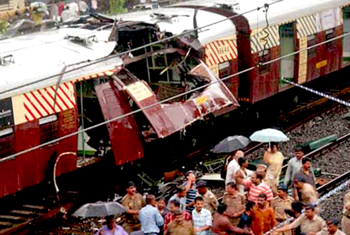Mumbai, Sep 15: A special MCOCA court may pronounce quantum of sentence to the convicted 12 of the 13 accused for their involvement in the July 11, 2006 Mumbai suburban train bombings on Tuesday.

Designated MCOCA Judge Yatin D Shinde had on September 11 held them guilty of complicity in the crime while acquitting 34-year-old Abdul Wahid Shaikh, also an accused, in the case.
They were found guilty of planting bombs in local trains which exploded at various stations in the peak hours causing panic among the commuters returning home from work.
Yesterday, all the twelve convicts found guilty in the case pleaded leniency in the court on the point of sentence citing humanitarian grounds.
The judge called each convict before him and recorded their respective statements on the quantum of sentence to be awarded to them.
After the court records their statements, their lawyers and the prosecution would argue on the quantum of sentence.
Convict Kamal Ansari pleaded that minimum punishment be given to him. "I have small kids", Ansari told the court, as per PTI.
Another convict, Tanvir Ahmed, a doctor, said he had chosen the profession to help the poor and he wished to serve the needy.
He also said that he had worked in a charitable hospital.
Another convict, Mohammed Faisal Shaikh, also prayed for a lesser sentence saying he was suffering from brain tumor for the past three years.
"I got brain tumor in jail. I also have spine-related ailments". He said he was not convicted by any court earlier and does not have any intention to commit any crime in future.
Yet another convict, Ehtesham Siddiqui, told the court that he hails from a poor family and was operating a small business (before arrest). "I could not get education as we were poor and with great difficulty I was able to learn. My brother runs the family and he is not financially sound", said Siddiqui.
All the convicts submitted a written statement to the court highlighting the mitigating circumstances in the case and said they should not be given capital punishment.
Mohammed Majid Shafi told the court that he has no criminal antecedents and had a footwear shop.
Another convict, Shaikh Alam Shaikh, said he was a hawker at the time of arrest.
"I used to do social service and report about illegal activities in my locality. My parents were old and infirm. The police have falsely implicated me in this case", Alam said.
Mohammed Sajid Ansari told the court that he is innocent like the accused in Malegoan 2006 blast case.
Another convict, Muzzammil Shaikh, told the court he was innocent and had no criminal record.
Also, there is nobody to take care of his parents.
Another convict, Soheil Mehmood Shaikh, told the court that leniency may be shown to him. He said that he had learnt chiropractic treatment to improve spine health of people and also acupressure. Thus, he is helping inmates in the jail.
Zamir Ahmed Shaikh said he was a graduate and helping his 75-year-old father in business as he is suffering many ailments.
Another convict Naveed Hussain, the only accused who gave his statement in English, told the court that he was a law- abiding citizen of India and have been working for a MNC.
Asif Khan also said that he had full faith in judiciary. He said that before his arrest he was the sole bread-winner of his family which includes his wife, three children and parents.
The defence lawyers also yesterday filed applications seeking medical records of the convicts, reports from a probationary officer and permission to produce evidence on mitigating circumstances.
Senior lawyer Yug Chowdhary said the applications were made so that there was no doubt about the statements of the convicts that they had undergone a mental trauma.
The court later called for the medical reports of the accused.
Advocate Prakash Shetty, arguing for five convicts, said the law has changed and now reformation is given importance.
He also said capital punishment should not be awarded when the nature of the evidence against the convicts is circumstantial.
All the convicts cannot be branded as bomb-planters, Shetty said, arguing that participation in a conspiracy and participation in the actual crime were two different things.






Comments
Add new comment